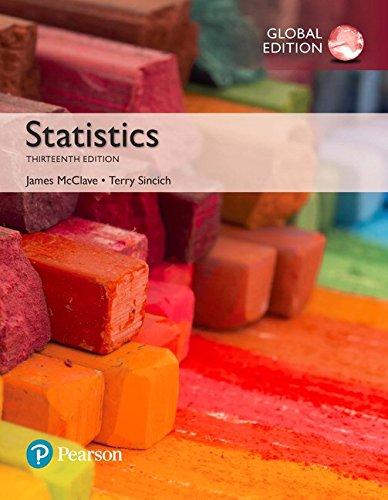Restoring self-control when intoxicated. Does coffee or some other form of stimulation really allow a person suffering
Question:
Restoring self-control when intoxicated. Does coffee or some other form of stimulation really allow a person suffering from alcohol intoxication to “sober up”? Psychologists investigated the matter in Experimental and Clinical Psychopharmacology (Feb. 2005). A sample of 44 healthy male college students participated in the experiment. Each student was asked to memorize a list of 40 words (20 words on a green list and 20 words on a red list). The students were then randomly assigned to one of four different treatment groups (11 students in each group). Students in three of the groups were each given two alcoholic beverages LO4 to drink prior to performing a word completion task.
Students in Group A received only the alcoholic drinks.
Participants in Group AC had caffeine powder dissolved in their drinks. Group AR participants received a monetary award for correct responses on the word completion task. Students in Group P (the placebo group) were told that they would receive alcohol, but instead received two drinks containing a carbonated beverage (with a few drops of alcohol on the surface to provide an alcoholic scent).
After consuming their drinks and resting for 25 minutes, the students performed the word completion task. Their scores (simulated on the basis of summary information from the article) are reported in the table. (Note: A task score represents the difference between the proportion of correct responses on the green list of words and the proportion of incorrect responses on the red list of words.)
AR AC A P .51 .50 .16 .58 .58 .30 .10 .12 .52 .47 .20 .62 .47 .36 .29 .43 .61 .39 - .14 .26 .00 .22 .18 .50 .32 .20 - .35 .44 .53 .21 .31 .20 .50 .15 .16 .42 .46 .10 .04 .43 .34 .02 - .25 .40 Based on Grattan-Miscio, K. E., and Vogel-Sprott, M. “Alcohol, intentional control, and inappropriate behavior: Regulation by caffeine or an incentive.”
Experimental and Clinical Psychopharmacology, Vol.
13, No. 1, Feb. 2005 (Table 1).
a. What type of experimental design is employed in this study?
b. Analyze the data for the researchers, using a = .05. Are there differences among the mean task scores for the four groups?
c. What assumptions must be met in order to ensure the validity of the inference you made in part b?
Step by Step Answer:






